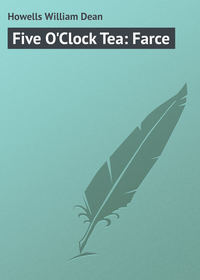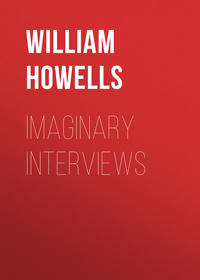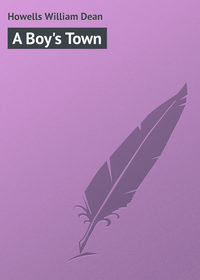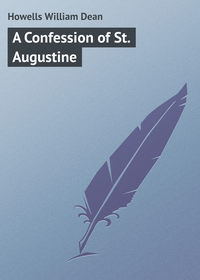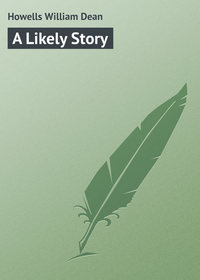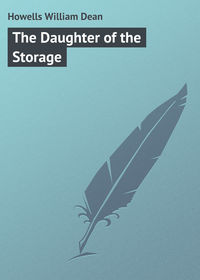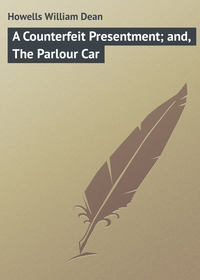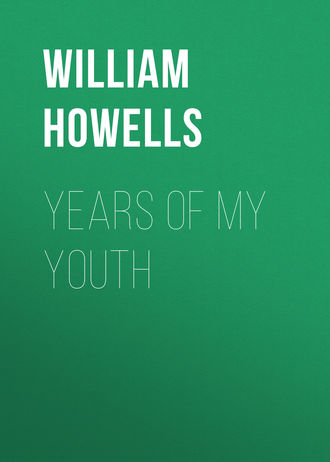 полная версия
полная версияYears of My Youth
He was buoyed up, above all other things, by the interest of journalism, which for those once abandoned to it is indeed a kind of enchantment. As I knew it then and afterward, it has always had far more of my honor and respect than those ignorant of it know how to render. One incident of it at this time so especially moved me that I will give it place in this wayward tale, though it is probably not more to the credit of the press than unnumbered others which others could cite. A miserable man came late one night to ask that a certain report which involved his good name, and with it the good name of a miserable woman, and the peace of their families, might be withheld. He came with legal counsel, and together they threshed the matter out with our editorial force upon the point whether we ought or ought not to spare him, our contention being that as a prominent citizen he was even less to be spared than a more unimportant person. Our professional conscience was apparently in that scruple; how it was overcome I do not remember, but at last we promised mercy and the report was suppressed.
It was one of the ironies of life that after the only suspected avenue to publicity had been successfully guarded, the whole fact should have cruelly come out in another paper the next morning. But I cannot feel even yet that the beauty of our merciful decision was marred by this mockery of fate, or that the cause of virtue was served by it, and I think that if I had been wiser than I was then I would have remained in the employ offered me, and learned in the school of reality the many lessons of human nature which it could have taught me. I did not remain, and perhaps I could not; it might have been the necessity of my morbid nerves to save themselves from abhorrent contacts; in any case, I renounced the opportunity offered me by that university of the streets and police-stations, with its faculty of patrolmen and ward politicians and saloon-keepers. The newspaper office was not the Capitol of Ohio; I was not by the fondest imputation a part of the state government, and I felt the difference keenly. I was always very homesick; I knew nobody in the city, and I had no companionship except that of my constant friend, whom I saw only in our hours of work. I had not even the poor social refuge of a boarding-house; I ate alone at a restaurant, where I used sadly to amuse myself with the waiters’ versions of the orders which they called down a tube into the kitchen below. The one which cheered me most was that of a customer who always ordered a double portion of corn-cakes and was translated as requiring “Indians, six on a plate.”
Nearly all the frequenters of this restaurant were men from their stores and offices, snatching a hasty midday meal, but a few were women, clerks and shop-girls of the sort who now so abound in our towns and cities, but then so little known. I was so altogether ignorant of life that I thought shame of them to be boldly showing themselves in such a public place as a restaurant. I wonder what they would have thought, poor, blameless dears, of the misgivings in the soul of the conscious youth as he sat stealing glances of injurious conjecture at them while he overate himself with the food which was the only thing that could appease for a moment the hunger of his homesick heart. If I could not mercifully imagine them, how could I intelligently endure the ravings of the drunken woman which I heard one night in the police-station where my abhorred duties took me for the detestable news of the place? I suppose it was this adventure, sole of its sort, which clinched my resolve to have no more to do with the money-chance offered to me in journalism. My longing was for the cleanly respectabilities, and I still cannot think that a bad thing, or if experience cannot have more than the goodly outside in life, that this is not well worth having. There was a relief, almost an atonement, or at least a consolation in being sent next day to report a sermon, in fulfilment of my friend’s ideal of journalistic enterprise, and though that sermon has long since gone from me and was perhaps at the time not distinctly with me, still I have a sense of cleansing from the squalor of the station-house in listening to it. If all my work could have been the reporting of sermons, with intervals of sketching the graduating ceremonies of young ladies’ seminaries, such as that where once a girl in garnet silk read an essay of perhaps no surpassing interest, but remained an enchanting vision, and the material of some future study in fiction; if it could have been these things, with nothing of police-stations in it, I might have tried longer to become a city editor. But as it was I decided my destiny in life differently.
V
I must not conceal the disappointment which my father delicately concealed when I returned and took up my old work in the printing-office. He might well have counted on my help in easing him of his load of debt, from the salary I had forgone, but there was no hint of this in the welcome given me in the home where I was again so doubly at home with my books and manuscripts. Now and then my friend of the Gazette management managed to have some sketch of mine accepted for it, and my life went on in my sister’s literary companionship on much the same terms as before our venture into the world the winter before. My father’s clerkship had ended with the adjournment of the legislature in the spring, but in the autumn, when it grew toward winter, I asked again for the correspondence of the Gazette. I got this by favor of my friend, and then I had courage to ask for that of the Cleveland Herald, which the interest of the blithe sexagenarian sufficed to secure me, and I returned to the capital with no pretense that I was not now writing the letters solely and entirely myself. But almost before my labors began my health quite broke under the strain of earlier over-study and later overwork. I gave up my correspondence for both those honored newspapers to my father, who wrote it till the close of the session, and at his suggestion the letters of the Gazette fell the next winter to the fit and eager hands of a young man who had just then sold his country newspaper and had come to try his fortune in the capital. His name was Whitelaw Reid, in the retrospect a tall, graceful youth with an enviable black mustache and imperial, wearing his hair long in the Southern fashion, and carrying himself with the native ease which availed him in a worldly progress uninterrupted to the end. He wrote the legislative letters so acceptably that when the Civil War broke out the Gazette people were glad to make him their correspondent in the field, where he distinguished himself beyond any other war correspondent in the West, or the East for what I knew. The world knows how riches and honors followed him all his days, and how when he died the greatest Empire sent his dust home to the greatest Republic in such a war-ship as the war correspondent of those years could not have dreamed of. From time to time we saw each other, but not often; he was about his business in the State House, and now I was about mine in the office of the Ohio State Journal, the organ of the Republican party, which had been newly financed and placed on a firm footing after rather prolonged pecuniary debility.
I was at home in the autumn, as I had been all the summer, eating my heart out (as I would have said in those days) when the call to a place on the Journal’s editorial staff incredibly, impossibly came, and I forgot my ills, and eagerly responded. I hardly know how to justify my inconsistency when I explain that this place was the same which I had rejected at twice the salary on the Cincinnati Gazette. Perhaps I accepted it now because I could no longer endure the disappointment and inaction of my life. Perhaps I hoped that in the smaller city the duties would not be so odious or so onerous; perhaps it was because I would have been glad to return to Columbus on any terms; in any case it fell out that the duties of the place were undertaken by another who doted on them, and quite different and far more congenial functions were assigned to me.
My chief was Henry D. Cooke, the successful editor and proprietor of a newspaper in northern Ohio, and brother of the banker Jay Cooke, once nationally noted in our finance and himself afterward Governor of the District of Columbia, the easiest of easy gentlemen, formed for prosperity and leisure, with an instinct for the choice of subordinates qualified to do the journalistic work he soon began to relinquish in his preoccupation with the politics of the capital. I have had no sweeter friend in a life abounding in friends, and after fifty years I think of his memory with gratitude for counsels which availed me much when given and would avail me still if I should ever again be a youth of twenty-one, proposing to do and say the things I then proposed. He rarely blamed anything I did in the stirring and distracted period of our relation, but one morning he brought me a too graphic paragraph, about a long-forgotten homicide done by an injured husband, and said, “Never, never write anything you would be ashamed to read to a woman,” and so made me lastingly ashamed of what I had done, and fearful of ever doing the like again, even in writing fiction. It seems not to be so now with our novelists, begun or beginning; they write many things they ought to be ashamed to read to women, or if they are of that sex, things they should be ashamed to read to men. But perhaps they are ashamed and only hold out writing so for art’s sake; I cannot very well speak for them; but I am still very Victorian in my preference of decency.
Mr. Cooke must have been often of a divided mind about his assistants, or about their expression of the opinions which he reticently held in common with them. He was a thorough Republican; he undoubtedly believed that the time had come for calling black black, but his nature would have been to call it dark gray, at least for that day or for the next. He would have oftenest agreed with us in what we said of the pro-slavery party and partisans, North and South, though he held it not honesty to have it thus set down. He would have liked better the milde Macht of a Hahnemannian treatment, while we were blistering and cauterizing, and letting blood wherever we saw the chance, and there were every day chances enough. I had been made news editor, and in the frequent intervals of our chief’s abeyance I made myself the lieutenant of the keen ironical spirit who mostly wrote our leaders, but did not mind my dipping my pen in his ink when I could turn from the paste and scissors which were more strictly my means of expression. My work was to look through the exchange newspapers which flocked to us in every mail, and to choose from them any facts that could be presented to our readers as significant. I called my column or two “News and Humors of the Mail,” and I tried to give it an effect of originality by recasting many of the facts, or, when I could not find a pretext for this, by offering the selected passages with applausive or derisive comment. We had French and Spanish and German exchanges, and I sometimes indulged a boyish vanity by prefacing a paragraph from these with such a sentence as, “We translate from the Courrier des États Unis,” or, “We find in La Cronaca of New York,” or “We learn from the Wachter am Erie,” as the case might be. Why I should have been suffered to do this without admonition from our chief or sarcasm from my senior I do not know; perhaps the one thought it best to let youth have its head when the head was harmlessly turned; and perhaps the other was too much occupied with his own work to trouble himself with mine; but certainly if I had caught a contemporary in such folly I should have tried what unsparing burlesque could do to make him wiser.
The reader who has no follies to own will probably not think me wise in owning mine, but from time to time I must do so; there were so many. It is with no hope of repairing these follies now that I confess the pride I felt in the poor little Spanish, German, and French which it had cost me so much to acquire unaided and unguided, and I was willing that my acquirements should shed luster on the newspaper I loved almost as much as I loved myself. I admired it even more, and I wished to do all that I could to make it admirable, even enviable, with others. I think now that I was not using one of the best means to do it; I only contend that it was one of the best I could think of then. If any contemporary had turned it against us, I hope I should have been willing to suffer personally for it, but I cannot now be sure.
VI
We aspired at least tacitly to a metropolitan character in our journalism; there were no topics of human interest which we counted alien to us anywhere in the range of politics, morals, literature, or religion; and I was suffered my say. The writer who was more habitually and profitably suffered his say was, I still think, a man of very uncommon qualities and abilities. He was a journalist who could rightly be called a publicist, earnest if things came to that, of a faithful conscience and of a mocking skill in the chances pretty constantly furnished us by our contemporaries, especially some of our Southern contemporaries whom it was difficult to take as seriously as they took themselves. When they made some violent proclamation against the North, or wreaked themselves in some frenzy of pro-slavery ethics, we took our pleasure in shredding the text into small passages and tagging each of these with a note of open derision or ironical deprecation. We called it “firing the Southern heart,” in a phrase much used at the time. It was not wise, it was not well, but it was undeniably amusing, and we carried it to any lengths that the very intermittent supervision of our nominal chief would allow. We may have supposed that it would help laugh away the madness of the South which few in the North believed more than a temporary insanity, but the uneasy honesty which always lurks somewhere in my heart to make me own my errors must acquit my fellow-editor of the worst excesses in this sort, so mainly literary with me. He was not only a man of high journalistic quality, of clear insight, shrewd judgment, and sincere convictions, but I do not believe that in the American press of the time he was surpassed as a clear thinker and brilliant writer. All the days of journalism are yesterdays; and the name of Samuel R. Reed will mean nothing to these oblivious morrows, even in Ohio, but all the more I wish to do his memory such honor as I may. We were of course daily together in our work, and often in our walks on the Sundays which were as other days to his steadfast agnosticism. The word was not yet, but the thing has always been, and especially it always was in the older West, where bold surmise of the whence and whither of life often defied the authority of Faith, then much more imperative than now. Reed’s favorite author, whom he read as critically as if he were not his favorite, was Shakespeare; but his far more constant reading was the Bible, especially the Old Testament. I could not say why he read it so much, but he may have felt in it the mystical power which commands the imagination of men and holds them in respectful contemplation of a self-sufficing theory of the universe such as nothing in science or philosophy affords. He quoted it for a peculiar joy in the fitness of its application to every circumstance; he quoted Dickens, as everybody did then; he quoted Shakespeare a great deal more both in his talking and in his writing; and later in his life, long after mine had parted from it, he amused the spare moments of his journalistic leisure by a study of Shakespeare’s women whom he did not take at the generally accepted critical appraisement.
I am tempted out of the order of these confessions to follow him to the end which death put to the long kindness between us, and I recall with tenderness our last meeting near New York where he was hesitating whether to continue on his way to Europe. He had at last given up his work in Cincinnati where he had spent the many years after the few years we spent together in Columbus. He owned that he had worn himself out in that work, toiling incessantly through many homicidal Cincinnati summers, and he blamed himself for the sacrifice. He felt that he had turned from it too late; and in fact he died at sea soon after. He accepted his impending doom with the stoical calm which he always kept, and which I had once seen him keep so wonderfully after the war began, when a Southern Unionist, the formerly famous, now forgotten Parson Brownlow of Tennessee, came to reproach him for the part which he held that such writing as Reed’s had borne in bringing on the strife. Reed suffered the good man’s passion almost with compassion, and when Brownlow was gone he would not let me blame him, but said that he had played a noble part in the struggle to hold his region in the Union. He always kept a countenance of bland calm, lit by pale-blue eyes which gave no hint of the feeling within, and if I had not loved him so much and known him so well I might have thought the habitual smile of his clean-shaven lip sometimes a little cruel. He let his full soft beard grow inordinately long, and he had a way of stroking it as he slightly smiled and crisply spoke; it was the only touch of quaintness in him at a time when beards were self-indulgently worn in many fantastic ways. He was the best-dressed man I knew, in fashions as little aged as possible in their transition from the East to the West, and he was of a carefulness in such minor morals as gloves and boots very uncommon in our somewhat slovenly ways.
After his liking for Shakespeare and Dickens he liked the Ingoldsby Legends, but he did not care for the poetry which I was constantly reading and trying to write. The effect of my endeavor as it appeared in the passionate or pessimistic verse which I contributed to Eastern periodicals must have amused him; but perhaps he tolerated me because, along with this poetical effusiveness in which I was grievously sensitive to any breath of sarcasm, I had a tooth as sharp as his own in our journalism. He was intelligently and I suppose scientifically fond of music, since he failed of no chance to hear the best, a chance rare in our city; and he held that the composition of grand opera was the highest feat of the human intellect, which was to me a stumbling-block and foolishness, though I liked dramatic singing, and indeed singing of all kinds. We came together in our fondness for the theater, and after our evening’s work was done he sometimes turned with me into the barnlike structure on State Street which served the pathetic need of the drama in Columbus at that day. The place was heated in the winter for its twenty or thirty frequenters by two huge cast-iron stoves, one on either side of the orchestra: stoves such as I have since seen in English cathedrals; but when the curtain rose the blast of freezing air that swept out upon us made us shiver for the players in their bare arms and necks and their thin hosiery and drapery. They were often such bad players that they merited their sufferings; the prompter audibly bore a very leading part in the performance as he still does in the Italian theater; yet for all his efforts we one night saw Hamlet in two acts; it was, to be sure, a very cold night, of an air eagerer and nippinger than even that the ghost walked in at Elsinore, and we would not have had the play longer. Yet we often saw very well given some of the old English comedies which are now no longer well or ill given; and between the acts, somewhere, a plain young girl, in a modest modicum of stocking, represented the ballet by dancing the Highland Fling, always the Highland Fling. Such plays as “The Lady of Lyons” happened now and then, and “The Daughter of the Regiment” must have been, at least partly, sung. We did not lack the more darkling melodrama, and there were heroic pieces which gave the leading actor opportunities not lost upon him, however they failed of effect with the rest of the cast. I remember how one night a robustuous periwig-pated fellow ramped and roared up and down the stage, but left quite cold a large group of the dramatis personæ which his magniloquence was intended to convulse with either sympathy or antipathy; and how Reed noted with mock-thoughtful recognition of the situation, “Can’t excite those fellows off to the left, any.” I should not be able to say how killingly droll I found this.
VII
I suppose that every young man presently attempting journalism feels something of the pride and joy I felt when I began it; though pride and joy are weak words for the passion I had for the work. If my soul was more in my verse, I did not know it, and I am sure my heart was as much in my more constant labors. I could find time for poetry only in my brief noonings, and at night after the last proofs had gone to the composing-room, or I had come home from the theater or from an evening party, but the long day was a long delight to me over my desk in the room next my senior. To come upon some inviting fact, or some flattering chance for mischief in an exchange, above all a Northern contemporary with Southern principles, and to take this to him and talk it or laugh it over and leave it with him, or bring it back and exploit it myself, was something that made every day a heyday. We shunned personalities, then the stock in trade of most newspaper wits; we meant to deal only with the public character of men and things. It seems to have been all pleasure as I tell it, but there was a great deal of duty in it, too; though if burlesquing the opposite opinions of our contemporaries happened to be a duty, so much the better. If it were to do again, I should not do it, or not so much; but at the time I cannot deny that I liked doing it. So, too, I liked to write cutting criticisms of the books which it was part of my work to review; and I still hope to be forgiven by the kindness which I sinned against without winning the authority as reviewer which I aimed at.
I had much better been at the theater than writing some of the things I then wrote. But it may as well be owned here as anywhere that whatever might have been its value to me as a school of morals the theater was not good society in Columbus then; and I was now in a way of being good society, and had been so for some time. The rehabilitation of our newspaper was coincident with the rise of the Republican party to the power which it held almost unbroken for fifty years. It had of course lost the Presidential election in 1856, but its defeat left it in better case than an untimely victory might have done. Ohio had, at any rate, a Republican Governor in a man afterward of a prime national importance, and already known as a statesman-like politician well fitted by capacity and experience for that highest office which never ceased to be his aim while he lived. Salmon P. Chase had been a lawyer of the first standing in Cincinnati, where, although a Democrat, he had early distinguished himself by his services in behalf of friendless negroes. The revolt of the whole self-respecting North against the repeal of the Missouri Compromise swept him finally out of the Democracy into that provisional organization which loosely knew itself as the Anti-Nebraska party; but before he was chosen Governor by it he had already served a term in the United States Senate, where with one other Freesoiler he held the balance of power in an otherwise evenly divided body. He was a large, handsome man, of a very senatorial presence, and now in the full possession of his uncommon powers; a man of wealth and breeding, educated perhaps beyond any of the other Presidential aspirants except Seward, versed in the world, and accustomed to ease and state; and he gave more dignity to his office, privately and publicly, than it had yet known among us. He lived in a pretty house of the Gothic make then much affected by our too eclectic architecture, with his brilliant young daughter at the head of it; for the Governor was a widower.
He was naturally much interested in the new control of the Republican organ, and it would not be strange if he had taken some active part in its rehabilitation, but I do not know that he had. At any rate, he promptly made the editorial force welcome to his house, where Reed and I were asked to Thanksgiving dinner; Mr. Cooke had not yet brought his family to Columbus. Thanksgiving was not then observed on the present national terms; it was still the peculiar festival of New England, and in our capital its recognition was confined to families of New England origin; our Kentuckians and Virginians and Marylanders kept Christmas, though the custom of New-Year’s calls was domesticated among us with people of all derivations, and in due time suffered the lapse which it fell into in its native New York. Our Governor was born in New Hampshire, where his family name was already distinguished in public life; and he kept the Thanksgiving which he had probably not officially invited his fellow-citizens to commemorate. I suppose we had turkey for our dinner, but I am surer of the manner than the make of the feast, for it was served with a formality new to my unworldly experience. The turkey was set before the governor who carved it, and then it was brought to the guests by a shining black butler, instead of being passed from hand to hand among them, as I had always seen it done. That was, in fact, my first dinner in society.


